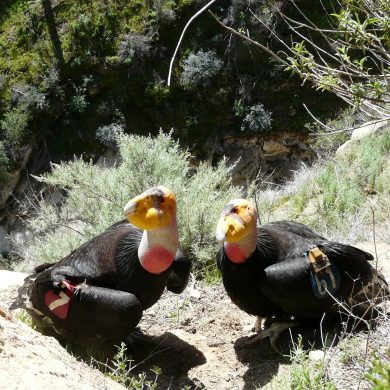January 4
Reindeer are critically endangered, and I couldn’t believe it when I first read about it in articles. These creatures are also referred to as woodland caribou, but that name probably doesn’t garner the type of nostalgic and mystical image that the general public responds to.
The reindeer is the only species of the deer family in which both males and females have antlers. They are found exclusively in boreal forests and the tundra, which cover most of northern Canada and Russia. Due to logging, poaching, climate change, and development, reindeer are one of the most critically endangered mammals. One of the reindeer’s major food items is arboreal lichen, which often grows on the trunks of mature conifers. Living off of a diet of grasses, mosses, and fungi, these herbivores require a large, healthy expanse to support their dietary habits.

Nestled within a patch of bushes, a caribou was patiently scouring the ground for edible foliage. It occasionally perked up in response to some sound its sensitive ears picked up. So many of my pictures came out looking like the reindeer was a part of the still life. It stood calm and sturdy unaware of the human staring at it for the past half an hour.
You would think that if such a harmless and iconic animal was in harm’s way,people would have the sense to leave it and its habitat alone. However, the desire to extract oil from the ground of the reindeer’s habitat is too great, and the company TransCanada is willing to hack through the caribou’s home range (where it naturally can be found) for some low-quality fuel.

Bitumen, the low-grade petroleum found in Canada’s tar sands, would be sucked up and sent to Texas via an enormous pipe if the U.S. Congress passes development permits to build this Keystone XL Pipeline.  The garbage-quality fuel has been mined since 2000, and since then, two million acres of ancient forest has been devastated.
The garbage-quality fuel has been mined since 2000, and since then, two million acres of ancient forest has been devastated.
If losing reindeer is the price to pay for large amounts of low-quality fuel, I don’t think I’m willing to pull out any cash. Losing animals of any size in a habitat can lead to a devastated food web within that ecosystem. We need to focus our efforts towards improving renewable energy rather than sucking the earth dry, and taking down entire species with it. Companies like TransCanada should take responsibility for the consequences their actions hold for environment. I sound like a raging activist, but it’s hard not to when I’ve seen creatures in their natural state. It’s a beauty like no other and raising my voice to preserve each unique species and habitat has become an inherent part of me.

